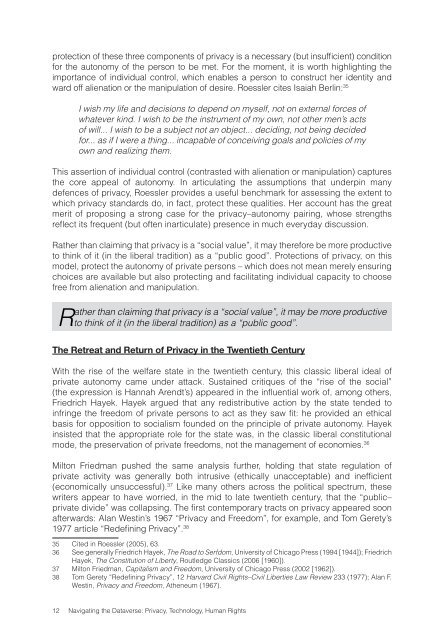Navigating the Dataverse: Privacy, Technology ... - The ICHRP
Navigating the Dataverse: Privacy, Technology ... - The ICHRP
Navigating the Dataverse: Privacy, Technology ... - The ICHRP
Create successful ePaper yourself
Turn your PDF publications into a flip-book with our unique Google optimized e-Paper software.
protection of <strong>the</strong>se three components of privacy is a necessary (but insufficient) condition<br />
for <strong>the</strong> autonomy of <strong>the</strong> person to be met. For <strong>the</strong> moment, it is worth highlighting <strong>the</strong><br />
importance of individual control, which enables a person to construct her identity and<br />
ward off alienation or <strong>the</strong> manipulation of desire. Roessler cites Isaiah Berlin: 35<br />
I wish my life and decisions to depend on myself, not on external forces of<br />
whatever kind. I wish to be <strong>the</strong> instrument of my own, not o<strong>the</strong>r men’s acts<br />
of will... I wish to be a subject not an object... deciding, not being decided<br />
for... as if I were a thing... incapable of conceiving goals and policies of my<br />
own and realizing <strong>the</strong>m.<br />
This assertion of individual control (contrasted with alienation or manipulation) captures<br />
<strong>the</strong> core appeal of autonomy. In articulating <strong>the</strong> assumptions that underpin many<br />
defences of privacy, Roessler provides a useful benchmark for assessing <strong>the</strong> extent to<br />
which privacy standards do, in fact, protect <strong>the</strong>se qualities. Her account has <strong>the</strong> great<br />
merit of proposing a strong case for <strong>the</strong> privacy–autonomy pairing, whose strengths<br />
reflect its frequent (but often inarticulate) presence in much everyday discussion.<br />
Ra<strong>the</strong>r than claiming that privacy is a “social value”, it may <strong>the</strong>refore be more productive<br />
to think of it (in <strong>the</strong> liberal tradition) as a “public good”. Protections of privacy, on this<br />
model, protect <strong>the</strong> autonomy of private persons – which does not mean merely ensuring<br />
choices are available but also protecting and facilitating individual capacity to choose<br />
free from alienation and manipulation.<br />
Ra<strong>the</strong>r than claiming that privacy is a “social value”, it may be more productive<br />
to think of it (in <strong>the</strong> liberal tradition) as a “public good”.<br />
<strong>The</strong> Retreat and Return of <strong>Privacy</strong> in <strong>the</strong> Twentieth Century<br />
With <strong>the</strong> rise of <strong>the</strong> welfare state in <strong>the</strong> twentieth century, this classic liberal ideal of<br />
private autonomy came under attack. Sustained critiques of <strong>the</strong> “rise of <strong>the</strong> social”<br />
(<strong>the</strong> expression is Hannah Arendt’s) appeared in <strong>the</strong> influential work of, among o<strong>the</strong>rs,<br />
Friedrich Hayek. Hayek argued that any redistributive action by <strong>the</strong> state tended to<br />
infringe <strong>the</strong> freedom of private persons to act as <strong>the</strong>y saw fit: he provided an ethical<br />
basis for opposition to socialism founded on <strong>the</strong> principle of private autonomy. Hayek<br />
insisted that <strong>the</strong> appropriate role for <strong>the</strong> state was, in <strong>the</strong> classic liberal constitutional<br />
mode, <strong>the</strong> preservation of private freedoms, not <strong>the</strong> management of economies. 36<br />
Milton Friedman pushed <strong>the</strong> same analysis fur<strong>the</strong>r, holding that state regulation of<br />
private activity was generally both intrusive (ethically unacceptable) and inefficient<br />
(economically unsuccessful). 37 Like many o<strong>the</strong>rs across <strong>the</strong> political spectrum, <strong>the</strong>se<br />
writers appear to have worried, in <strong>the</strong> mid to late twentieth century, that <strong>the</strong> “public–<br />
private divide” was collapsing. <strong>The</strong> first contemporary tracts on privacy appeared soon<br />
afterwards: Alan Westin’s 1967 “<strong>Privacy</strong> and Freedom”, for example, and Tom Gerety’s<br />
1977 article “Redefining <strong>Privacy</strong>”. 38<br />
35 Cited in Roessler (2005), 63.<br />
36 See generally Friedrich Hayek, <strong>The</strong> Road to Serfdom, University of Chicago Press (1994 [1944]); Friedrich<br />
Hayek, <strong>The</strong> Constitution of Liberty, Routledge Classics (2006 [1960]).<br />
37 Milton Friedman, Capitalism and Freedom, University of Chicago Press (2002 [1962]).<br />
38 Tom Gerety “Redefining <strong>Privacy</strong>”, 12 Harvard Civil Rights–Civil Liberties Law Review 233 (1977); Alan F.<br />
Westin, <strong>Privacy</strong> and Freedom, A<strong>the</strong>neum (1967).<br />
12 <strong>Navigating</strong> <strong>the</strong> <strong>Dataverse</strong>: <strong>Privacy</strong>, <strong>Technology</strong>, Human Rights
















